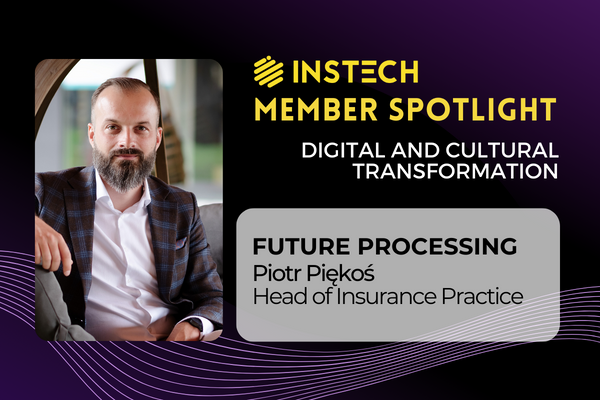Member Spotlight: Future Processing
Could you introduce Future Processing?
Future Processing is a technology consultancy and software engineering firm. For over two decades, we have helped over 200 clients transform their businesses with technology. Our wide experience has allowed us to evolve from bespoke software development to strategic technology consultancy, offering a range of services including data engineering, cloud migration, and other professional services to help companies reach their full potential.
I lead Future Processing’s insurance practice, which specialises in providing these services to the insurance industry. We work with a wide range of insurance companies, from innovative startups to established industry leaders in the London Market.
What problems is Future Processing solving for London Market and specialty insurers?
The specialty insurance market tends to be conservative regarding technology. In recent years, however, there have been more and more London Market insurers, brokers and MGAs modernising their organisations. Future Processing’s insurance practice exists to help organisations achieve digital transformation swiftly with dedicated technology consulting services for data engineering, data science and cybersecurity.
However, we do not believe that technological change alone is sufficient to meaningfully alter a company’s operations. A company’s culture should lead the transformational effort. This is an area that Future Processing has supported insurance organisations with for many years.
How can you change an organisation’s culture and why is this important?
For example, moving to the cloud is a common digital transformation project for insurance organisations. This involves moving legacy software or data to the cloud or rewriting software to make it cloud-based.
More often than not, an organisation’s leadership prioritises technological change. At Future Processing, we start by asking how this change will affect the company’s operational culture and how existing software delivery and maintenance processes can change and ideally be improved with the technology.
With some customers, we derive the necessary cultural shift from the technological change; with others, we provide specific services like agile coaching for individual contributors, delivery teams and IT departments to support cultural change from the bottom up.
We find that companies that can consciously alter their organisational culture are more successful with technology adoption and yield better financial results.
What benefits are insurers seeing from cloud technology when they implement the technological and cultural changes?
Cloud is not usually any cheaper than old-fashioned, on-premises technology. The real benefit is how it enables insurance organisations to deliver value to their customers more efficiently and innovate more quickly.
Companies also benefit from the cultural change that the move to the cloud brings. If companies migrate to the cloud in the right way, they divide their monolithic software into more granular pieces, which helps companies manage their software better in the future.
What other technological changes are providing value to specialty insurers?
The other key area is data. Insurers have vast amounts of data, which are growing with new trends such as embedded insurance and telematics. Insurers want to derive meaningful insights from their data, but acquiring the capabilities that enable them to do this can be overwhelming. For example, when underwriters have access to several different data sources, it can be harder to make an underwriting decision.
A trend we see at Future Processing is companies asking us to put a layer between the data and the person using the data. This layer homogenises and standardises the data using technology such as data lakes.
Having data in order is a prerequisite to taking full advantage of more advanced technologies such as AI. Many companies want to experiment with AI, but this requires investment in data engineering first.
What insurance innovation trends are you following?
Interest in generative AI is surging and several companies are experimenting with it. Future Processing believes the two areas where AI will have the most immediate impact in insurance are claims processing at scale and analysing unstructured documents.
AI is already being used to detect fraudulent claims. Generative AI can analyse unstructured documents more effectively and help triage claims between those that can be straight-through processed and those that need human oversight. This can ultimately improve insurers’ combined ratios (a measure of profitability that takes into account operating expenses and claims paid).
What makes a good partnership between technology consultancies and insurance companies?
Because culture is an important aspect of how Future Processing approaches technology consulting, we always start a partnership by estimating cultural compatibility between us and our client. Understanding the cultural differences and aligning them helps to enable better outcomes.
Another important aspect is the capability of the technology consultancy. Future Processing has centres of excellence internally that relate to a broad range of areas, not just one niche competency. As a result, we can quickly change what resources are being offered based on what the client requires on a specific day or week. This creates operational agility and means the project can follow the pace that the organisation requires.
What clients does Future Processing work with?
Future Processing’s specialism is working with insurers, large brokers and large MGAs on transformation projects. We also work with insurtech companies. Our clients include Hiscox, MD Insurance and NorthStandard.
Why has Future Processing joined InsTech as a corporate member?
Although Future Processing has worked in the insurance sector for more than a decade, in 2022 we launched our insurance practice as part of a conscious effort to get more involved in the insurance market. Joinng InsTech is a natural next step in building our presence in the Insurance Market.
What sort of companies would Future Processing like to connect with and how can they get in touch?
Insurers and other London Market participants are the key organisations that we would like to connect with. To get in touch, contact Future Processing on our website.


